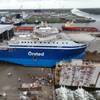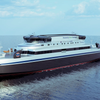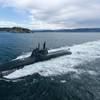Air Cavity System Aims to Help Reduce Emissions
DK Group will install its emissions-reducing Air Cavity System (ACS) technology on a 12,580 deadweight ton (DWT) multi-purpose vessel owned by Danish shipowner and ship management company Dannebrog Group.
The deal marks the first time that DK Group's patented air lubrication technology has been installed on an international commercial vessel, and represents significant progression in the adoption of clean technology within the shipping industry.
The Air Cavity System uses air bubbles in the boundary layer of the vessel to reduce frictional resistance between the water and the hull surface. The fuel efficiency generated by ACS will be up to 10 percent and will depend on vessel type and size. The investment payback period will range between 18 months and 3 years.
Sea trials will be conducted by hydrodynamic research company HSVA and overseen by classification society Germanischer-Lloyd, both pre- and post-conversion to establish and benchmark relative fuel consumption and the associated emission profile. The Air Cavity System will be retrofitted onto a 12,580 DWT multi-purpose heavy lift vessel in Q3 2012, before potentially being rolled out across a fleet of six sister vessels.
“Our decision to install DK Group's Air Cavity System onto one of our new-built, multi-purpose vessel reflects our commitment to innovation and sustainability, as well as the future vision for our fleet,” said Johan Wedell-Wedellsborg, Chairman of Dannebrog Group. “We believe that we have a responsibility to the environment, as well as to implement a strategy which mitigates our exposure to rising bunker fuel prices. With a mixed fleet of 17 vessels within the Dannebrog Group of companies, including ro-ro, containers, cargo, heavy lift, products and chemical tankers, today's announcement reflects our long-held tradition of delivering for customers through innovative and sustainable solutions, which meet regulations, reduce fuel consumption and decrease environmental impact.”











